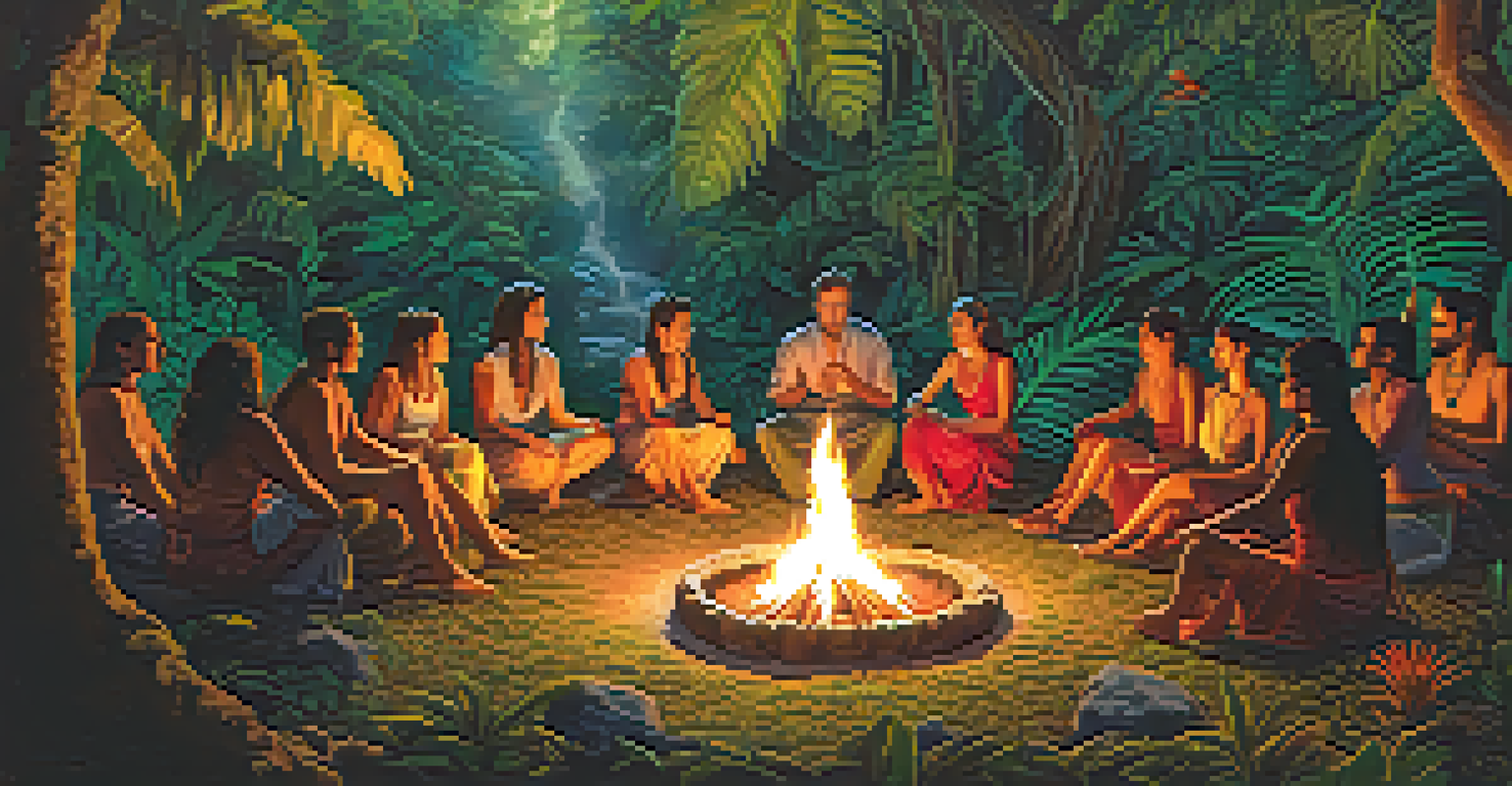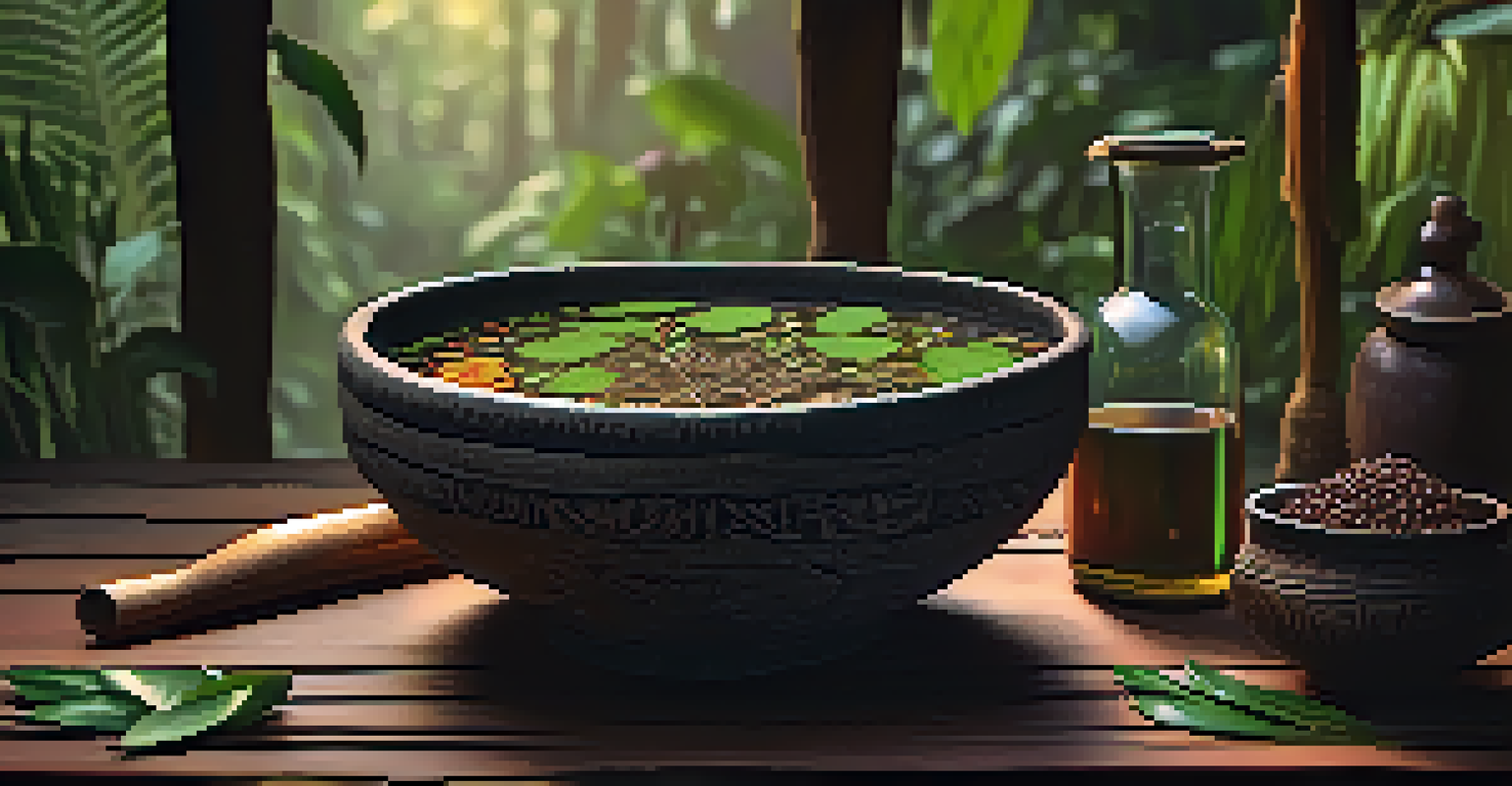Ayahuasca's Journey: From Indigenous Rituals to Global Phenomenon

Understanding Ayahuasca and Its Origins in Indigenous Cultures
Ayahuasca is a powerful brew made from the Banisteriopsis caapi vine and other plants, used traditionally by Indigenous tribes in the Amazon. Its use dates back thousands of years, primarily among communities in Peru, Brazil, and Colombia, where it serves as a sacred tool for healing and spiritual insight. The ritualistic consumption of Ayahuasca is often led by a shaman, who guides participants through the experience, fostering a deep connection to nature and the spiritual world.
The experience of Ayahuasca is not just a personal journey; it is a collective exploration of the spiritual and the profound, guiding individuals to a deeper understanding of themselves and their place in the universe.
For these Indigenous cultures, Ayahuasca is more than just a substance; it represents a profound relationship with the environment and the cosmos. The ceremonies surrounding its use are steeped in tradition, often accompanied by music, chants, and the presence of community, which enhances the collective experience. This holistic approach emphasizes the importance of context in understanding the brew's effects, making it a deeply personal and communal journey.
As the world becomes increasingly aware of mental health issues and the limitations of conventional therapies, the appeal of Ayahuasca's healing properties is gaining traction beyond its traditional roots. However, it’s essential to respect and honor the Indigenous practices that have safeguarded this knowledge for generations, ensuring that the cultural significance of Ayahuasca is not lost in its globalization.
The Role of Shamans in Ayahuasca Ceremonies
Shamans are central figures in Ayahuasca ceremonies, often regarded as spiritual leaders or healers within their communities. Their role is not only to prepare the brew but also to facilitate the journey, using their knowledge and experience to navigate the often intense psychological and emotional landscapes that participants encounter. This guidance is crucial, as it helps individuals feel safe and supported during their transformative experiences.

During a ceremony, the shaman may sing traditional songs known as 'icaros,' which are believed to carry healing energy and assist in guiding participants through their visions. Each shaman has their unique style and repertoire, which can influence the experience significantly. This connection between the shaman and the participants fosters an environment of trust, allowing for deeper introspection and healing.
Ayahuasca's Cultural Significance
Ayahuasca is a sacred brew deeply rooted in Indigenous traditions, serving as a tool for healing and spiritual insight.
As Ayahuasca's popularity spreads globally, the role of the shaman has come under scrutiny. Authenticity and ethical considerations arise when individuals seek out shamans outside of their cultural context, raising questions about cultural appropriation and the commodification of Indigenous traditions. It's vital for seekers to approach these experiences with sensitivity and respect, acknowledging the deep-rooted significance of the practices they are engaging in.
Ayahuasca's Healing Potential: Science Meets Spirituality
Research into Ayahuasca's effects has revealed promising results, particularly in treating mental health issues such as depression, anxiety, and PTSD. Studies suggest that the brew may promote neuroplasticity, helping the brain form new connections and overcome harmful patterns. This scientific interest in Ayahuasca bridges the gap between traditional healing practices and modern psychology, highlighting the brew's potential as a therapeutic tool.
In the world of Ayahuasca, the shaman is the navigator, guiding the participants through the sometimes turbulent waters of their own consciousness, ensuring they return safely to the shore of their reality.
The active compounds in Ayahuasca, such as DMT (dimethyltryptamine) and harmine, interact with the brain's serotonin receptors, leading to altered states of consciousness. These experiences can lead to profound insights and emotional releases, allowing participants to confront and process traumas. Many report feelings of interconnectedness, clarity, and a renewed sense of purpose following their journeys, which can be deeply transformative.
However, while the preliminary findings are encouraging, it’s essential to approach Ayahuasca with caution. The brew is not a panacea, and experiences can vary widely among individuals. Further research is needed to understand the long-term effects and potential risks associated with its use, ensuring that those seeking healing do so in a safe and informed manner.
The Global Spread of Ayahuasca: Trends and Challenges
In recent years, Ayahuasca has become a global phenomenon, drawing seekers from all corners of the world to partake in ceremonies. This growing interest has led to the establishment of retreat centers in locations far from the Amazon, often catering to tourists looking for spiritual awakening or healing. While this expansion has made Ayahuasca more accessible, it also raises ethical concerns regarding cultural appropriation and exploitation of Indigenous practices.
As Ayahuasca retreats pop up in places like Europe and North America, the authenticity of these experiences can vary significantly. Some centers prioritize genuine connections to Indigenous traditions, while others may prioritize profit over cultural integrity. This disparity can dilute the profound significance of the rituals and teachings associated with Ayahuasca, potentially leading to misunderstandings and misrepresentations of its cultural roots.
Role of Shamans in Ceremonies
Shamans facilitate Ayahuasca ceremonies, guiding participants through intense emotional experiences and ensuring a safe environment.
Navigating the landscape of Ayahuasca tourism requires discernment. Participants should research retreat centers thoroughly, seeking those that honor and respect Indigenous traditions. Engaging with the cultural context and understanding the potential impacts of participating in these ceremonies can enrich the experience and support the preservation of the practices that have existed for centuries.
Personal Stories: Transformative Experiences with Ayahuasca
Many individuals who have participated in Ayahuasca ceremonies share transformative stories that highlight the brew's profound impact on their lives. From overcoming deep-seated fears to gaining clarity on life’s purpose, these experiences often lead to significant personal growth. For instance, one participant described how Ayahuasca helped her confront childhood trauma, allowing her to release years of emotional baggage and embrace healing.
These narratives often emphasize the unexpected nature of the Ayahuasca journey. Participants frequently encounter visions or insights that challenge their perceptions and beliefs, leading to a deeper understanding of themselves and their relationships. Such experiences can be both cathartic and enlightening, fostering a sense of connection to others and the universe at large.
However, it’s important to remember that not every journey is smooth or positive. Some participants may face challenging emotions or confront difficult truths during their sessions. These struggles can be integral to the healing process, underscoring the importance of having proper support and guidance throughout the experience.
Navigating Risks: Safety and Ethical Considerations
While Ayahuasca can offer profound insights and healing, it is not without risks. Individuals with certain medical conditions or those taking specific medications, particularly SSRIs, should approach Ayahuasca with caution. The brew can interact negatively with some drugs, leading to dangerous side effects. Therefore, it's crucial for potential participants to conduct thorough research and consult with healthcare professionals before embarking on an Ayahuasca journey.
Additionally, the increasing popularity of Ayahuasca has led to a rise in unqualified facilitators and exploitative retreat centers. Participants must be vigilant in their selection of practitioners, ensuring they are experienced and respected within the Indigenous community. A lack of proper guidance can lead to unpreparedness for the intense emotional and psychological experiences that Ayahuasca can provoke.
Navigating Ayahuasca's Global Appeal
The global rise of Ayahuasca has sparked ethical concerns regarding cultural appropriation and the authenticity of retreat experiences.
Ultimately, prioritizing safety and ethical considerations is essential for anyone considering Ayahuasca. Engaging in open dialogues about its risks, benefits, and cultural significance can help create a more informed and respectful approach to this powerful practice.
The Future of Ayahuasca: Balancing Tradition and Modernity
As Ayahuasca continues to gain global attention, the challenge lies in balancing its rich cultural heritage with modern approaches to healing. Indigenous communities must be actively involved in discussions about the future of Ayahuasca, ensuring that their voices are heard and respected. This collaboration can help preserve the integrity of traditional practices while allowing for responsible exploration of the brew's potential benefits in contemporary contexts.
Moreover, the growing interest in Ayahuasca invites an opportunity for education and advocacy. By sharing knowledge about the cultural significance and historical context of Ayahuasca, practitioners can help bridge the gap between traditional and modern perspectives. This understanding fosters a deeper appreciation for the complexities of the brew and the importance of respectful engagement with Indigenous cultures.

The future of Ayahuasca is still unfolding, and it holds the potential for both healing and growth. By approaching this journey with curiosity and respect, individuals can contribute to a more harmonious relationship between ancient traditions and modern seekers, ensuring that the wisdom of Ayahuasca endures for generations to come.